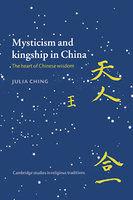
Book Summary
Here we look at over 4,000 years of Chinese civilization through the lens of the relationship between kingship and mysticism. Author Julia Ching suggests that institutions of kingship were bound up with the cultivation of trance states and communication of spirits. Over time, the sage-king myth became a model for the actual ruler. In this book, Julia Ching offers a survey of over 4,000 years of Chinese civilization through an examination of the relationship between kingship and mysticism. She investigates the sage-king myth and ideal, arguing that institutions of kingship were bound up with cultivation of trance states and communication with spirits. Over time, the sage-king myth became a model for the actual ruler. As a paradigm, it was also appropriated by private individuals who strove for wisdom without becoming kings. As the Confucian tradition interacted with the Taoist and the Buddhist, the religious character of spiritual and mystical cultivation became more pronounced. But the sage-king idea continued, promoting expectations of benevolent despotism rather than democratization in Chinese civilization.
Book Details
| Book Name | Mysticism And Kingship In China: The Heart Of Chinese Wisdom |
| Author | Julia Ching, John Clayton, Steven Collins |
| Publisher | Cambridge University Press (Nov 1997) |
| ISBN | 9780521468282 |
| Pages | 328 |
| Language | English |
| Price | 2176 |








